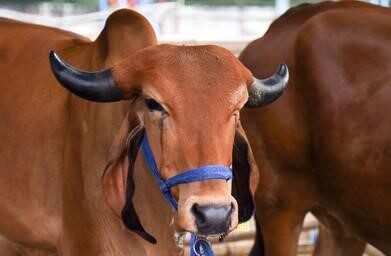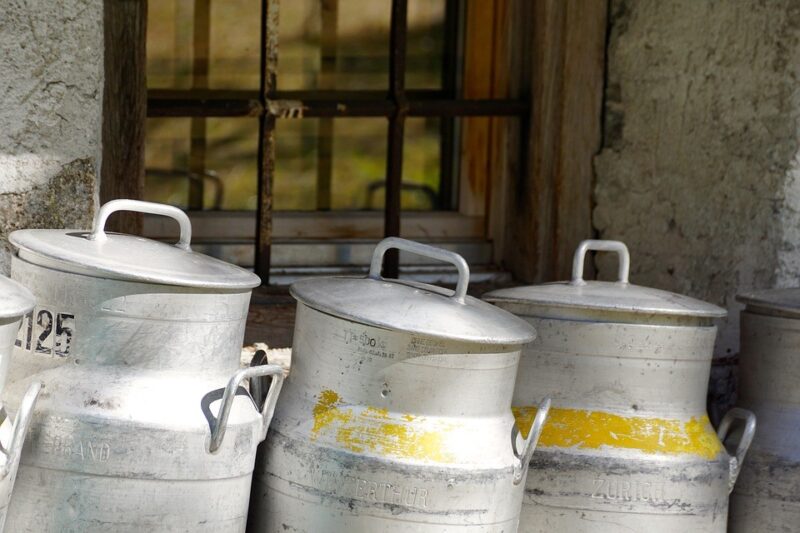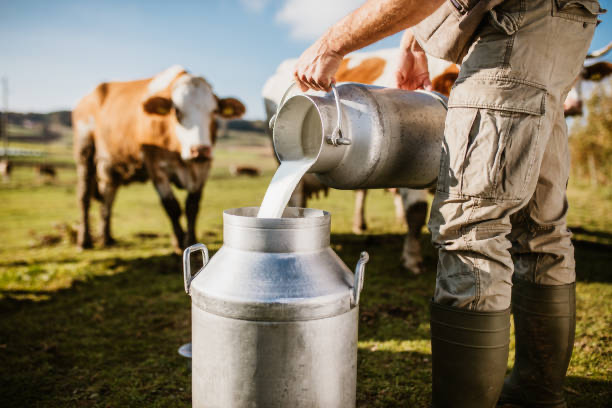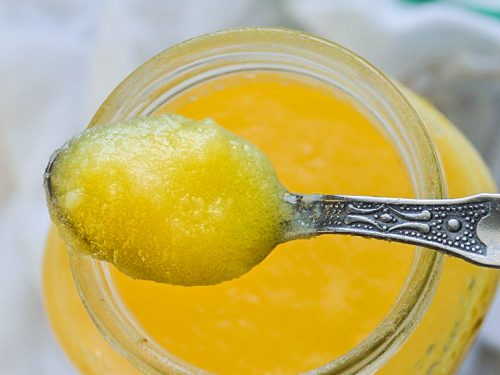With so many brands of ghee out there, do you get confused about which one to buy or not? Or whether to buy ghee at all, wondering if it’s even healthy? Do words like organic herbal ghee, organic cultured ghee, A2 cultured ghee have you confused? Worry not, we have you covered. And we’re in the mood to bust some myths too! There are literally scores of brands in the market selling ghee, but all the so-called ghee are not the same – because all are not even ghee!
More About A2 Organic Cultured Ghee
A2 cultured ghee that is obtained via organic practices doesn’t contain allergens like the protein A1 beta-casein that has been linked with a host of negative health consequences such as stomach irritation, bloating and gastronomic issues, lactose intolerance, heart disease and Type 1 Diabetes. In addition to this, organic cultured ghee contains lactic acid (coming from the curd) which makes it a great probiotic and gut-friendly alternative.
Lactic acid aids digestion and is especially suitable for people suffering from gut-related issues or lactose intolerance. Cultured ghee is a natural digestive and stimulates the appetite that helps in a healthy digestive functioning. It also contains high contents of Butyric acid that stimulates the release of stomach acids to promote digestion and keep the intestinal walls healthy. It is also known to evoke a positive immune response, by lowering inflammation and improving absorption of food.
It is a rich source of Omega 3 and Omega 9, Calcium, essential amino acids and fatty acids along with Vitamins A, D, E and K. Cultured ghee is also rich in antioxidants and enhances the absorption of vitamins and minerals to strengthen our immune system. A2 cultured ghee is packed with many therapeutic, healing and nutritional benefits that are essential to our health and complete well being. To further explore its qualities, let’s bust a few myths about cultured ghee for you!
Myth #1: Ghee = Fat = Unhealthy
Did you know that Fat is the greatest source of energy in our diets?
While an excess of it is certainly unhealthy, not all fat is bad and is in fact necessary for our bodies, as part of a balanced diet.
Ghee is a great source of fat, and contrary to popular myth the fat it contains is not bad for our body. Cultured ghee is rich in saturated fats and short-chain fatty acids that actually help influence cholesterol in a good way.
Myth #2: High cholesterol
Desi ghee produces High Density Lipoprotein (HDL) which is good and important to our body, and does not raise cholesterol levels. It is essentially the LDL and VLDL that are bad cholesterol and cause harm. So anyone can safely consume ghee (in moderate quantities), even people suffering from high cholesterol or BP (in frugal quantities).
Myths #3 Bad for heart
Cultured desi ghee helps maintain the balance between good and bad cholesterol which is essential for heart health. It avoids the building up of plaque in the arteries when consumed in appropriate quantities, thereby avoiding potential heart diseases. In fact, it shows cardioprotective qualities and is widely used in Ayurvedic treatments of various heart diseases.
Myths #4 Leads to weight gain
Cultured ghee contains an abundant quantity of fat-soluble vitamins and healthy fatty acids. The essential amino acids present in ghee help fat cells to shrink in size. It also contains an Omega-6 fatty acid, called conjugated linoleic acid that helps in modifying the body’s composition and reduces body fat levels, which further helps in losing weight.
The source and property of the primary ingredient used, and the process involved in the making of ghee vary widely and therefore does the quality, costs, benefits of the end product we consume. There’s ghee made from buffalo’s milk, from desi cow’s milk, from milk obtained from hybridized varieties of cows, and from the milk of all different types of cow mixed. There is also the ghee not made from milk at all but chemicals – the synthetic ghee. None of these weigh the same on the scale of health and benefits that are supposed to be found in our desi superfood.
So, what’s the difference between these? And which one is the better alternative?
There are three points of difference here to understand so as to be able to choose the best for yourself. These are – the source of the milk, the milk itself, and the process used to make ghee from that milk. Take notes as we are discussing the basics here.
1. The Source
Good quality ghee comes from cow’s milk, not from buffalo because the latter contains larger amounts of fats. Traditionally as well, Ayurvedic ghee has always been prepared from the milk of a desi cow, grass-fed and free-grazed because that’s what cows like and also what makes their milk so nutritious.

2. The Milk
Here comes the second and even more important point to note – among cows, it should be the milk of desi cow and not hybridized varieties that have been genetically modified to produce more milk. Recent studies have illustrated the difference between the quality of milk of the two types – the A1 and A2 classification, which shows A2 type milk to be better quality, non-allergic and safe for all, aside from being nutritionally superior.

3. The Process
There are two common ways of preparing ghee. One makes use of malai, the primary ingredient milk, which is boiled to make ghee. And the second is the traditional and more scientific way that uses cultured dahi and the traditional ‘bilona’ method to churn out butter which is further slowly boiled to make ghee.

Summing up, Desi ghee cannot be called ‘shudh’ or 100% pure if it’s not pure at the source. If the cows are fed grass and foods that contain pesticides and chemical fertilizers then you cannot expect it to be pure, can you? Therefore, the organic practice of feeding good quality and nutrient-rich fodder that is free from harmful chemicals is necessary to ensure high quality and nutritionally rich milk and ghee.
Cultured Desi Ghee is an amazing superfood that is full of nutrition, health benefits and amazing qualities! Now that you know all about it, when are you bringing the healthy organic A2 cultured ghee home?
